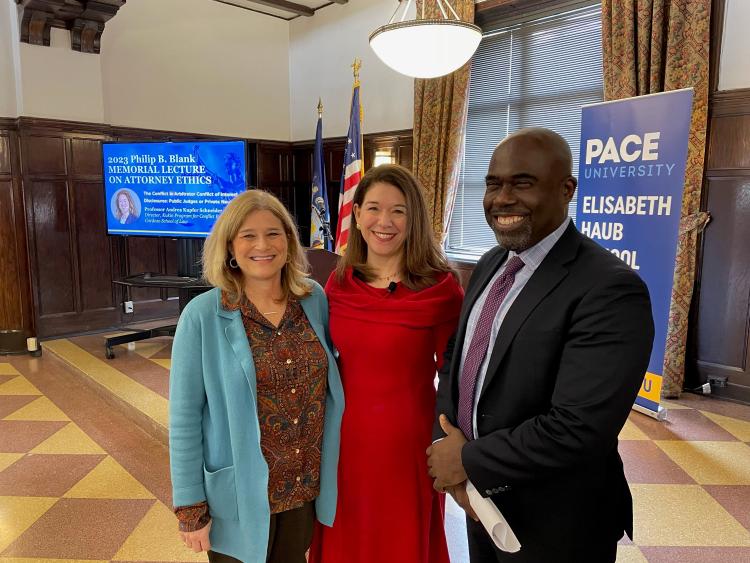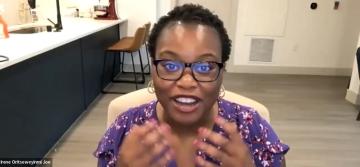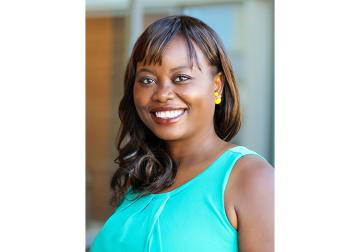Professor Andrea Kupfer Schneider Discusses Arbitration During the 2023 Philip B. Blank Memorial Lecture on Attorney Ethics

Professor Andrea Kupfer Schneider, Director of the Kukin Program for Conflict Resolution at Cardozo School of Law, Yeshiva University, delivered the 2023 Philip B. Blank Memorial Lecture on Attorney Ethics on Wednesday, March 1, speaking on "The Conflict in Arbitrator Conflict of Interest Disclosures: Public Judges or Private Neutrals?" The Philip B. Blank Memorial Lecture on Attorney Ethics was established by the family, friends and colleagues of the late Philip B. Blank, Associate Dean for External Affairs and Professor of Law at Pace University School of Law. In honor of Dean Blank's commitment to legal ethics, the Blank Lecture has presented distinguished members of the legal community recognized for their leadership in the area of attorney ethics and practice.
Elisabeth Haub School of Law Dean Horace E. Anderson Jr. gave welcoming remarks and had the pleasure of introducing Professor Andrea Kupfer Schneider. Dean Anderson noted that Professor Schneider is a “renowned professor, scholar and lecturer specializing in negotiation, plea bargaining, negotiation pedagogy, ethics, gender and international conflict.”
During her insightful lecture, Professor Schneider started by explaining to the audience that “Arbitration is ubiquitous. It is everywhere, so we really should pay attention to what is going on.” She focused on the role of the arbitrator, who is a private decision-maker substituted for a public judge, and how our legal system ensures that arbitrators are neutral to maintain justice. She posed three critical questions: At what point in the arbitration process do we ensure justice? Who is the best actor to enforce justice in arbitration? And, what is the best ethical standard we should use to guarantee arbitrator neutrality?
Professor Schneider then reviewed the current standards of neutrality under both the Federal Arbitration Act (“evident partiality” could lead to vacatur of an award) and various forum rules, which focus on pre-hearing disclosure of circumstances that create even an appearance of bias. She demonstrated how these standards do not always lead to an arbitration panel without bias or an appearance of bias. In terms of reform, Professor Schneider stated that, in part because “courts have been absolutely reluctant to rule on disqualification,” revising the Act to provide clear language would be best. “An amendment that gives courts the ability to review or step in earlier in the arbitration process to ensure that the neutrals are the right neutrals in the first place would likely be the best option for reform,” said Professor Schneider.
Professor Schneider is the Director of the Kukin Program for Conflict Resolution at Cardozo School of Law, Yeshiva University. Previously, she was director of the nationally ranked ADR program at Marquette University Law School for over two decades, where she was also the inaugural director of the university’s Institute for Women’s Leadership. She has been the recipient of numerous awards including the Woman of the Year Award by the Wisconsin Law Journal and the Association for Women Lawyers. She also received the ABA Section of Dispute Resolution Award for Outstanding Scholarly Work, the highest scholarly award given by the ABA in the field of dispute resolution. Additionally, Professor Schneider is prolific author, with many articles and textbooks to her credit, including most recently Dispute Resolution: Beyond the Adversarial Model (with Carrie Menkel-Meadow, Lela Love and Michael Moffitt) now in its third edition. She regularly presents her work and provides negotiation trainings around the world. Among her many leadership roles, Professor Schneider is a founding editor of Indisputably, the blog for ADR law faculty, and the founder of the Dispute Resolution Works-in-Progress annual conference. Professor Schneider received her A.B. cum laude from Princeton University’s School of Public and International Affairs and her J.D. cum laude from Harvard Law School. She also received a Diploma from the Academy of European Law in Florence, Italy.
Following the lecture, law students, faculty and guests had an opportunity to ask questions during a Q&A session led by Haub Law Professor Jill Gross, an expert in dispute resolution and arbitration, along with an arbitrator for the American Arbitration Association. Many questions focused on the opportunity for reform in arbitration, with Professor Schneider noting that, “The interesting thing to me in tracking arbitration legislation is that there have been so many attempts in Congress for reform. I think that there could be a bipartisan agreement to give states more power or back some power.”
Past Blank lectures were delivered by various distinguished experts and academics in the area of Attorney Ethics and Practice, including most recently, Irene Oritseweyinmi Joe, Professor of Law, UC Davis School of Law, Mimi Rocah, Westchester County District Attorney, and others.
WATCH THE 2023 PHILIP B. BLANK LECTURE


